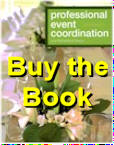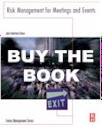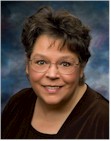|
Standards: Fear or the Future?
Published in Mark Sonder Productions Ezine, February 2005
In my work towards developing a framework for a global Event Management Body of Knowledge (EMBOK) I have encountered varied resistance to the term standards. This resistance ranges from the fear of governmental imposition of burdensome regulations to the fear that obstacles to free enterprise will be instituted, preventing us from pursuing the entrepreneurial dreams that led many of us into the planned special events business.
Standard is defined by the American College Dictionary as “anything taken by general consent as a basis of comparison; an approved model.” Standards are the criterion guidance that we and our stakeholder and client publics rely on to determine excellence, value, suitability, and probability of success. Standards will not only be used to judge our endeavors, they can also provide us with the guidance on how to become the best that we can be in our chosen endeavors.
We embrace such terms and concepts as Ethical Standards and Codes of Conduct. We, as an industry, regularly use the term Industry Standards, yet we, as an industry, have not developed and formally adopted voluntary consensus standards that establish the criterion for measuring quality, skills, knowledge or competency. We have yet to even quantify and qualify the very foundation needed to establish such criterion — our industry’s body of knowledge. And, as so many other industries have realized, this body of knowledge (and the standards that may be developed based on it) must be built upon a broad examination of and consensus reached by the industry.
When we look at creating a body of knowledge we are not striving to define the “how to”, but rather the scope of what the “how to” should include — what should be considered when developing curriculums, assessment criterion, process systems, and policies and legislation. From that baseline — the identification of the scope of knowledge and skills pertinent to this industry — the definition of competency will emerge that will enable the creation of proper assessment criteria and effective academic and professional development curriculums to prepare and enhance the expertise of event organizers. (Without standards of competency identified, how would one even begin to create effective curriculums?)
The challenge is greater in the U.S. because whereas other emerging countries seek industry standards to ensure viable and safe events as they build sustainable job capacity and opportunities, they have the advantage of starting from scratch; they are not trying to link together a hodgepodge of pockets of knowledge. The U.S. also suffers from federalism; each jurisdiction is free to adopt its own standards rather than conform to national standards (much less international standards).
It is the industry associations that should be in the forefront of developing and promoting consensus standards that, because they are created and validated by a broad industry representation, will typically be adopted by the individual jurisdictions. However, the event industry hasn’t even gotten to the point of agreement that it IS one industry; each practitioner association holds that it is the “leader” and still tries to minimize the status of the other disciplines.
Although this will likely generate heated opposition, my contention is that we need standards of entry into this occupation. Without such standards of entry (a degree, certification, licensing or other form of credentialing) wherein one has to demonstrate at least a certain breadth of knowledge—an awareness of the scope of responsibilities associated with these endeavors, we will not move to the status of a genuine profession that clients and consumers can trust. As long as we remain a business-card entry occupation (one only needs to have business cards printed to become a “professional”) the industry will continue to be stalled at the “trade” stage, unable to garner the respect for and value placed on the specialized knowledge and skill required to perform at a capable and accountable level.
Whether standards of entry will ever be required is unknown, but the marketplace will eventually demand them. Whether performance or process standards will ever be mandated is unknown, but the courts and governments will eventually establish them if we, as an industry, do not. Standards are in our future. Standards are the future. Let us embrace that fact and be proactive participants in their development.
Back to Publications
 
|



